|
|
|
Sort Order |
|
|
|
Items / Page
|
|
|
|
|
|
|
| Srl | Item |
| 1 |
ID:
165664
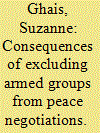

|
|
|
|
|
| Summary/Abstract |
This article examines the relationship between inclusion/exclusion of armed groups and the achievement of durable peace, using process tracing in two case studies: the peace process between the government of Chad and the rebel group Movement for Democracy and Justice in Chad, and the one between the government of the Philippines and the Moro National Liberation Front. The cases support theoretical arguments that excluded armed actors are more likely to renew armed confrontation after the peace accord. The study further elaborates the causal link: included armed rebels tend to negotiate for private benefits such as government posts and amnesty but also moderate their stances and emerge committed to the agreement; excluded armed actors lack any such commitment and still have unresolved grievances. They are thus more likely to renew armed action against the government.
|
|
|
|
|
|
|
|
|
|
|
|
|
|
|
|
| 2 |
ID:
131475
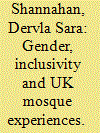

|
|
|
|
|
| Publication |
2014.
|
| Summary/Abstract |
Access to, management and attendance of places of worship often takes gendered forms. Gender imbalances in UK mosques manifests in attendance and management patterns and is reflected in the facilities available. The sense that mosques are perceived widely as 'prayer-clubs for men' (Maqsood 2005: 4-5) is often reflected in the physical spaces and facilities made available to female worshippers, and it must be noted that some mosques do not provide any of the latter at all (Dispatches 2006). Shockingly, a recent survey found that 'women form part of the congregation in [only] half (51%) of the organisations surveyed' (Coleman 2009: 10). Relatedly, UK Mosque management committees privilege male involvement, decision-making and leadership roles, with figures of as few as 15% women in management positions (Asim 2011: 34) and more who 'will simply not entertain the idea' (Asim 2011: 39). Such imbalances reflect the specificities of the UK-religious context (Maqsood 2005) yet, globally, women's mosque involvement appears to be changing far more rapidly than here. This paper explores how gender, religious identity and sexualities interface with women's mosque access, involvement and experiences therein. It draws upon original research with a sample of women, and indicates that inclusivity is an important topic in UK mosques, far beyond gender
|
|
|
|
|
|
|
|
|
|
|
|
|
|
|
|
| 3 |
ID:
178375


|
|
|
|
|
| Summary/Abstract |
In search of innovative solutions to address the growing complexity of civil wars, peacebuilding practitioners and conflict analysts have seriously begun exploring ways to involve national civil society actors in monitoring ceasefires. In contrast, the academic literature on the subject so far is surprisingly scarce and focuses mainly on the role of external third parties. This article argues that involving civil society in ceasefire monitoring mechanisms supports peace processes through four pathways: exposing noncompliance to ceasefire commitments; facilitating communication within and between conflict parties; promoting peace process issues among conflict parties; and socializing outside spoilers and raising public awareness about ceasefires. Based on a case study of the civil society-led National Monitoring Committee for the Ceasefire Code of Conduct (NMCC) appointed in the May 2006 ceasefire between the government of Nepal and Maoist rebels, the article shows that ceasefire monitoring by civil society can effectively prevent major ceasefire violations and support the parties’ transition to a peace agreement through the four pathways. The article also stresses that the NMCC faced commonly encountered constraints related to a lack of perceived impartiality, resources and diversity. It concludes that there is scope for a better operationalization of ceasefire monitoring mechanisms.
|
|
|
|
|
|
|
|
|
|
|
|
|
|
|
|
| 4 |
ID:
151498
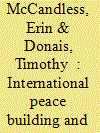

|
|
|
|
|
| Summary/Abstract |
This paper draws on constructivist theory to assess the contemporary debate around inclusion within peace-building and state-building processes and on inclusivity as an emerging norm within international policy processes. Within the wider context of an ongoing but still incomplete normative shift in terms of how peace building is both understood and practised, it focuses on the case of the New Deal for Engagement in Fragile States, and makes the case that the inclusivity agenda marks a significant shift towards fulfilling a longstanding commitment to respecting national ownership of peace-building processes.
|
|
|
|
|
|
|
|
|
|
|
|
|
|
|
|
| 5 |
ID:
142510
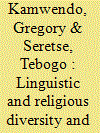

|
|
|
|
|
| Summary/Abstract |
Botswana, an African country, is characterized by linguistic and religious diversity. To this end, the paper assesses the extent to which the school curriculum accommodates and reflects the country’s linguistic and religious diversity. The paper argues that whilst Botswana’s Vision 2016 calls on the education system to accommodate linguistic diversity, the curriculum does not do so. Through the pursuit of a linguistic assimilation policy, the education system promotes and recognizes only one local language (Setswana), leaving other local languages out of the curriculum. In contrast, the curriculum houses a multi-faith religious education. This brand of religious education is an attempt to accommodate the religious diversity that exists in Botswana. Previously, schools had a mono-faith religious education syllabus. The multi-faith syllabus is considered to be a meaningful way of enabling learners to appreciate religious diversity.
|
|
|
|
|
|
|
|
|
|
|
|
|
|
|
|
| 6 |
ID:
157221


|
|
|
|
|
| Summary/Abstract |
This article discusses the nature of Islamic philanthropy and social services in the context of the plurality of Indonesian society by looking at the early development of Muhammadiyah’s charitable activities, known as Penolong Kesengsaraan Umum or by the acronym PKU (Assistance for the Relief of Public Suffering). This article asserts that PKU took an inclusive approach to humanitarian issues in providing social services to underprivileged groups and that this was claimed as being ‘without discrimination of religion and race or group.’ It analyses the ‘bridging’ and ‘bonding’ aspects of faith-based philanthropy as social capital and questions how it was that PKU could formulate inclusive ideas that underpin its vision and activities and that bolster Muhammadiyah’s label as a civil society organisation. Even though the ideas were overtaken at the end of the Dutch colonial period, the potential for an inclusive principle remained in place.
|
|
|
|
|
|
|
|
|
|
|
|
|
|
|
|
| 7 |
ID:
176507


|
|
|
|
|
| Summary/Abstract |
The field of peace and conflict studies has been maturing over the past few decades, not least thanks to the continual epistemological contestation between its philosophy and methodology. As a consequence, the methods of conflict resolution practice have been evolving. Dominated by realist approaches of conflict management during the Cold War, the field in the 1990s relied heavily on neo-liberal theories of economic interdependence, democracy building, and interest-based negotiations that can bring win-win outcomes. By the late 2000s, as the constructivist paradigm and critical theory started gaining ground in academia, the conceptual conversation shifted toward the possibilities of building inclusive societies and achieving structural and cultural peace via conflict transformation, rather than resolution, as the respective methodology.
|
|
|
|
|
|
|
|
|
|
|
|
|
|
|
|
| 8 |
ID:
171932
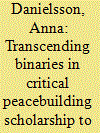

|
|
|
|
|
| Summary/Abstract |
In light of the recent turn to ‘inclusivity’ in peacebuilding practice, this article problematises established ways of ‘doing critique’ in peacebuilding scholarship. Inclusivity refers to the building of peace as a situated and co-constituted process. This entails what can be termed a new epistemic commitment: the acknowledgement that peacebuilding as a dynamic and emergent phenomenon is also an epistemically co-constituted process. In the article, I make two arguments. First, the move towards inclusivity places currently dominant modes of scholarly critique at an impasse. Persistent ontological and epistemological binaries preclude a productive investigation and challenging of inclusivity projects and their epistemic commitment. Second, I argue that, by returning to historical conditions that were formative in the very emergence of the category of ‘the local’, the conceptual basis of an alternative mode of critique (re)appears. This alternative critical project allows for an analytical sensibility to peacebuilding as emergent and adaptive. It makes it possible to disentangle power relations as these emerge between different and possibly unexpected configurations of actors and knowledge claims in inclusivity projects
|
|
|
|
|
|
|
|
|
|
|
|
|
|
|
|
| 9 |
ID:
154377
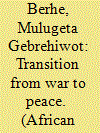

|
|
|
|
|
| Summary/Abstract |
The objective of this paper is to chronicle the 1991 to 1997 Ethiopian disarmament, demobilisation and reintegration (DDR) experience in the context of Ethiopia’s transition from war to peace. The DDR project is usually a post-conflict political project that should be analysed in the overall context of transition from war to peace. The literature on the Ethiopian experience is focused on the technical aspects of the programme and the assessment of its impacts, with little to no attempts made to capture the experience in the context of Ethiopia’s transition from war to peace. Given that there are many existing and several incoming post-conflict countries, capturing the successful Ethiopian DDR experience is important, as some aspects will inform the design of ongoing and upcoming transitions from war to peace. This paper illustrates the wider challenges of the transition from war to peace as a context for the DDR programme, delves into the key strategies and elements of the programme, and summarises its impact assessment. In the conclusion, the key lessons to be learned from the experience are laid out.
|
|
|
|
|
|
|
|
|
|
|
|
|
|
|
|
|
|
|
|
|